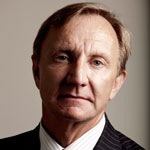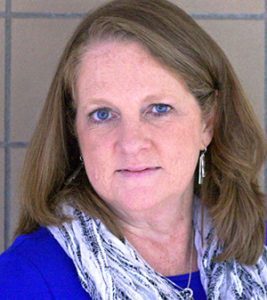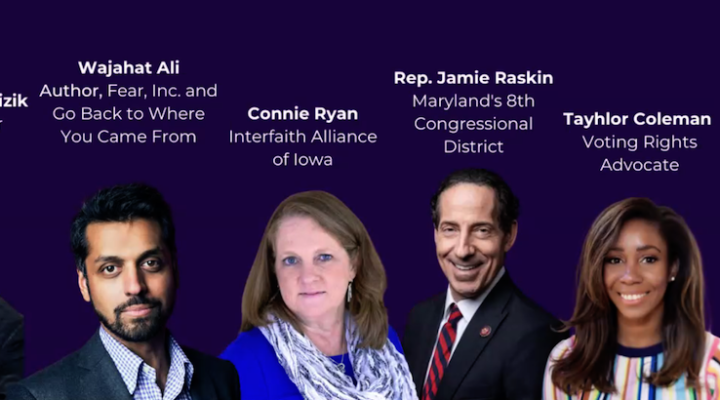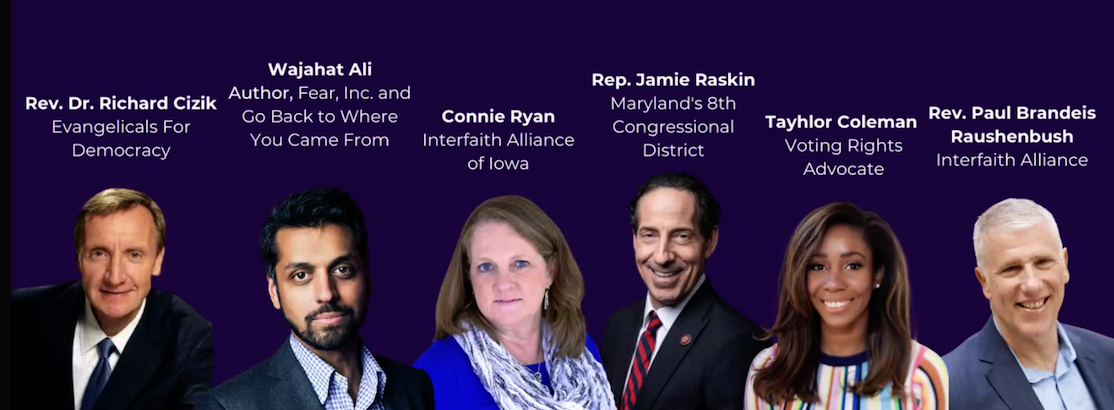Texas voting rights advocate Tayhlor Coleman despises Christian nationalism so much that she seethes at the very name of the white supremacist movement.

Tayhlor Coleman
“I actually bristle a bit every time I hear the word ‘Christian nationalism’ because when I look at the folks who are leading this movement, I don’t see any Christianity,” Coleman said during “Christian Nationalism is on the Ballot in 2022,” a Sept. 28 virtual and in-person briefing hosted from Capitol Hill by the Interfaith Alliance and its new president, Paul Brandeis Raushenbush.
“I grew up Southern Baptist, in an evangelical household, and to me (Christian nationalists) don’t represent my faith. I don’t concede that label to them at all. What I do see is the very same racism we’ve always had,” Coleman said. “As far as the theology that undergirds it, if racism could be considered a theology, that’s what I would say it is.”
“If racism could be considered a theology, that’s what I would say it is.”
Raushenbush, a Baptist minister and former executive editor of HuffPost Religion, said the morning briefing and its panelists were convened to sound a warning that Christian nationalism represents “a clear and present danger to our democracy” because it seeks an end to the separation of church and state and other basic American rights.

Paul Raushenbush
“Christian nationalism has its roots in the dangerous myth that we were founded as a Christian nation and, as a result, we enjoy special favor from God,” said Raushenbush, the great-grandson of Louis Brandeis, the first Jewish U.S. Supreme Court justice, and Baptist theologian and Social Gospel activist Walter Rauschenbusch.
The goal of the far-right political ideology is to use churches, the courts and government to consolidate power in the hands “of an exclusively political-religious movement,” he said.
“It will not be a government for the people and by the people, but a government for a particular people by a particular people.”
Non-Christians and Christians considered not to be real Americans will be viewed with perpetual suspicion and hostility, he warned. “It will not be a government for the people and by the people, but a government for a particular people by a particular people.”
Especially alarming is that polling shows a growing number of Americans are viewing their role in society through the Christian nationalist lens — a worldview that gave rise to the Jan. 6, 2021, assault on the U.S. Capitol, Raushenbush said. “As a Baptist pastor, I oppose Christian nationalism because I love my faith and I love my neighbors of all different faiths and no faiths.”
The whiteness of the Christian nationalism has kept it from being called what it really is: a terror movement that is threat to national security, said Muslim panelist Wajahat Ali, lead author of Fear, Inc., a project of the Center for American Progress, and author of Go Back to Where You Came From: And Other Helpful Recommendations on How to Become American.
Ali declared: “The question for the majority and mainstream institutions is: Will we finally name it? Will we finally acknowledge it? Will we finally educate ourselves about this threat and confront it and white supremacy as the greatest threats to our national security today?”
“Will we finally name it? Will we finally acknowledge it?”
The enthusiastic embrace of Christian nationalism by politicians such as U.S. Rep. Marjorie Taylor Greene , R.-Ga., and Pennsylvania Republican gubernatorial candidate Doug Mastriano demonstrate how deeply the ideology has seeped into American politics, Ali said.

Wajahat Ali
And another dangerous sign was uncovered in polling that found 61% of Republicans want the U.S. declared a Christian nation, he added. “Well so much for religious liberties, the separation of church and state and the Constitution. In fact, the Supreme Court’s recent ban on abortion violates the religious freedoms of Jews and Muslims, both communities that allow for abortions. Also say goodbye to marriage equality and the right to use contraceptives, which are also under threat.”
People of color and religious minorities also are in trouble if Christian nationalists ultimately win the day, Ali added.
“People who look like me, and … Muslims in particular, are seen as a unique threat to this idyllic, romanticized Christian America. We must be neutralized because we are invaders,” he said. “That includes feminists, Jews, immigrants of color, LGBTQ communities and even other Christians and Republicans who don’t agree with them. According to a source at (the Department of Homeland Security), Christian nationalism has become a major threat to communities of color, law enforcement and houses of worship.”
It’s high time that evangelicals speak out against Christian nationalism, said panelist Richard Cizik, president of the New Evangelical Partnership for the Common Good and executive director of Evangelicals for Democracy.
“We can no longer not repent of what is occurring.”
“We can no longer not repent of what is occurring, first of all. And no more excuses for what has occurred. We have to … see and think more clearly. I would suggest a whole lot of meta thinking needs to go on in our own community about what democracy is.”

Richard Civik
Cizik said he prefers a definition of Christian nationalism that describes it as “political idolatry dressed up as religious orthodoxy.”
Educating evangelicals about the movement is necessary to help them abandon it, he added, saying non-partisan, faith-based inspirational messages sent to evangelicals about democracy and the dangers of Christian nationalism is the goal of Evangelicals for Democracy. “If you were to ask an evangelical what Christian nationalism is, they probably couldn’t define it. They just know their part of it or believe in it.”
Panelist Connie Ryan, executive director of the Interfaith Alliance of Iowa, said she has been appalled to watch her state transform from historically “purple” to one dominated by right-wing, radical politics.
As a result, public schools and educators have been demonized and the LGBTQ community and reproductive rights are under legislative attack.
“We have legislators who would have been moderate five, six, seven years ago and they are shifting toward that Christian nationalism.”
“What I want you to hear is the normalization of this narrative that is coming from the Christian right — that is coming through Christian nationalism,” she said. “We have legislators who would have been moderate five, six, seven years ago and they are shifting toward that Christian nationalism.”

Connie Ryan
When asked what people can do to push back against Christian nationalism, Coleman suggested something like the door-to-door evangelism efforts employed by her childhood church.
Ryan also emphasized direct action: “You cannot sit on the sidelines. We need you to act. We need you to be part of the solution. We need you to use your voice. We need you to empower others and also to educate them on the issues and the impact that Christian nationalism is having at the national level and also at the state and local level.”
Ali urged religious leaders to be more vocal and visible in opposing Christian nationalism. “Speak out. You have to be willing to take some arrows. You can’t be a spectator anymore.”
Related articles:
Richard Land says he has ‘read about’ some Christian nationalists but he doesn’t know any
No, Rep. Boebert, the church is not supposed to ‘direct the government’ | Opinion by Michael Chancellor
Georgia representative says Christian nationalism actually is a good thing
Jeffress says he’s not a ‘Christian nationalist’ but America was founded as a ‘Christian nation’
Why Iran’s ‘morality police’ might seem like a good idea to some American evangelicals | Analysis by Rodney Kennedy


